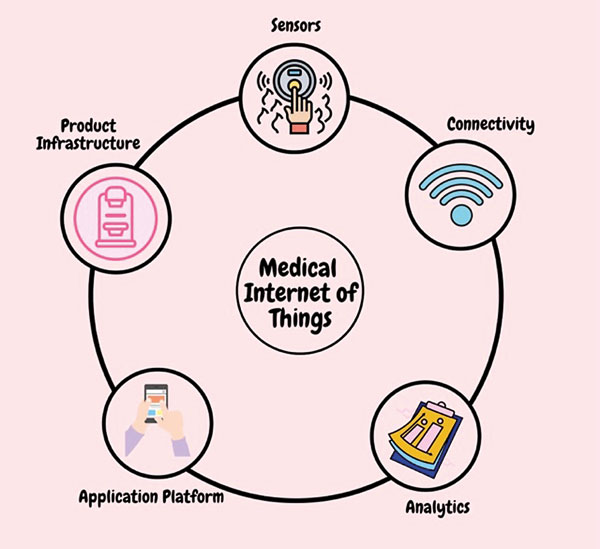Revolutionising Healthcare in Sri Lanka: The Power of IoT in Transforming Medical Industry
View(s):“The Internet of Things or simply IoT refers to an interconnected network of devices, sensors, and systems that collect and transmit data. In the medical sector, IoT technology can be used to improve patient care, streamline healthcare operations, and enhance the overall healthcare experience. Usages of IoT such as wearable devices, telemedicine, and remote monitoring systems can provide real-time health data, enabling healthcare providers to make more informed decisions and provide more personalized care. IoT can also improve the efficiency and cost-effectiveness of the healthcare system by automating certain processes and reducing the need for manual data entry and analysis.”

By: Mr.Chameera De Silva , Dr.Thilina Halloluwa. Department of Information Systems & Engineering, University of Colombo, School of Computing.
The current state of the medical sector in Sri Lanka
Sri Lanka has a well-developed healthcare system, with a network of government-run hospitals and clinics, as well as private healthcare providers. Despite these efforts, Sri Lanka still faces challenges in terms of healthcare accessibility and affordability, particularly in rural areas. The medical sector in Sri Lanka has been growing in recent years, driven by a growing population and rising healthcare expenditure. In recent years, Government has taken initiatives to improve the healthcare system by increasing investment in the sector, with a focus on making healthcare more accessible and affordable for all citizens.
Use of IoT in the Medical sector of Sri Lanka
Telemedicine is the use of technology to provide medical consultations and treatments remotely. IoT-enabled devices such as wearable devices and remote monitoring systems can transmit real-time patient data to healthcare providers, allowing for more accurate diagnosis and treatment. Remote monitoring also allows for continuous monitoring of patients, particularly those with chronic conditions, reducing the need for frequent in-person visits. Currently, our government has been investing in telemedicine and IoT-enabled healthcare solutions to improve healthcare accessibility especially in rural areas. Various private hospitals have also taken steps to invest in IoT-enabled devices and systems to improve the efficiency of their operations and patient care. There are also initiatives to implement IoT-enabled EHR systems and data analytics to improve population health management in the country. Some of the prominent players in the market are also providing IoT solutions for the medical sector of Sri Lanka.
IoT technology can improve the management and storage of electronic health records (EHRs), allowing for more efficient and secure sharing of patient information among healthcare providers. IoT-enabled devices can also collect and transmit data directly to EHR systems, reducing the need for manual data entry and improving data accuracy. IoT technology can also be used to analyze large amounts of data to identify patterns and trends, allowing for more effective population health management.
IoT technology can be integrated into medical devices and equipment, such as diagnostic tools and surgical equipment, to improve their performance and functionality. IoT-enabled devices can transmit data in real-time to healthcare providers, allowing for more accurate diagnosis and treatment. IoT technology can also be used to remotely monitor and maintain medical devices and equipment, reducing the need for on-site maintenance and repairs.
Challenges and Opportunities

Implementing IoT in the medical sector can be complex and challenging, as it requires the integration of various technologies and systems. Technical challenges can include interoperability issues, data management, storage, and the need for specialised skills and expertise. Ensuring the security and reliability of IoT-enabled devices and systems is also a major concern.
As IoT technology collects and transmits large amounts of personal health data, there are concerns about data privacy and security. Ensuring that patient data is protected from unauthorised access, hacking, and other security threats are crucial. Government policies and regulations must be in place to ensure that patient data is protected and used in compliance with privacy laws.
IoT technology can bring about significant improvements in healthcare accessibility, efficiency, and quality while making it an attractive opportunity for innovation in the medical sector. IoT technology can also help to reduce the cost of healthcare by automating certain processes and reducing the need for manual data entry and analysis. New business models can also be created around IoT-enabled healthcare services and products.
Government policies and regulations play a crucial role in shaping the development and implementation of IoT in the medical sector. Government initiatives and investments can help to support the development and adoption of IoT technology in healthcare. Government regulations must also ensure that IoT-enabled healthcare services and products are safe and effective, where patient data is protected.
Future Outlook
IoT technology is expected continuous growth in popularity in the medical sector of Sri Lanka, due to the increased demand for improved healthcare accessibility and quality. The government’s investment in the healthcare sector and the support for telemedicine along with other IoT-enabled healthcare solutions are expected to drive the growth of IoT in the medical sector. It is also expected that the private sector will continue to invest in IoT technology to improve the efficiency of their operations and patient care.
IoT technology has a significant potential to improve healthcare accessibility, particularly in rural areas, where access to healthcare is often limited. IoT-enabled devices and systems can provide real-time patient data, allowing for more accurate diagnosis and treatment, which can improve the overall quality of healthcare. Remote monitoring and telemedicine can also enable healthcare providers to provide care to patients regardless of their location, which can improve accessibility.
Opportunities for collaboration and partnerships
IoT technology can also open up new opportunities for collaboration and partnerships among healthcare providers, technology companies, and other stakeholders. Partnerships between the government, private hospitals, and technology companies can lead to the development and implementation of innovative IoT-enabled healthcare solutions. Collaboration among healthcare providers can also improve the sharing of patient data and information, which can improve the overall quality of healthcare.
The growth of IoT in the medical sector of Sri Lanka requires the support and investment of various stakeholders, including the government, private hospitals, technology companies, and healthcare providers. Stakeholders need to work together to address the challenges and take advantage of the opportunities presented by IoT technology. Government should continue to invest and create policies that support the growth of IoT in this sector. Private hospitals and technology companies should also invest in IoT technology and work together to develop and implement innovative solutions that improve healthcare accessibility and quality.
HitAd.lk is the best and biggest mobile phone market in Sri Lanka, and we guarantee you will find what you need here from our extensive listing of mobile phones for sale in Sri Lanka. Whether it’s a budget-priced smartphone for communication, or higher end features with advanced connectivity, there are many different options from which to choose from on our site!


